Literature Review on Ethical Consumerism and ShopHere Retail Store
VerifiedAdded on 2022/10/08
|11
|2341
|112
Literature Review
AI Summary
This literature review examines the role of ethical consumers in increasing revenue for the multi-channel retailer, ShopHere. It explores the concept of ethical consumption, the significance of consumer purchase decisions, and the theoretical framework of purchasing behavior, particularly the Theory of Reasoned Action (TRA). The review analyzes the linkage between ethical consumers and revenue generation, and proposes strategies for improving ethical consumption, such as fair-trade products and enhanced communication. The study identifies a literature gap regarding consumer perspectives on sustainability practices and focuses on how ethical concerns influence purchasing decisions. The conclusion emphasizes the relevance of ShopHere's strategies in the context of ethical fashion and highlights the need to build a strong base of ethical consumers. The review uses the Information Search Process (ISP) as a methodological framework, summarizing key findings, and provides a comprehensive analysis of the topic.
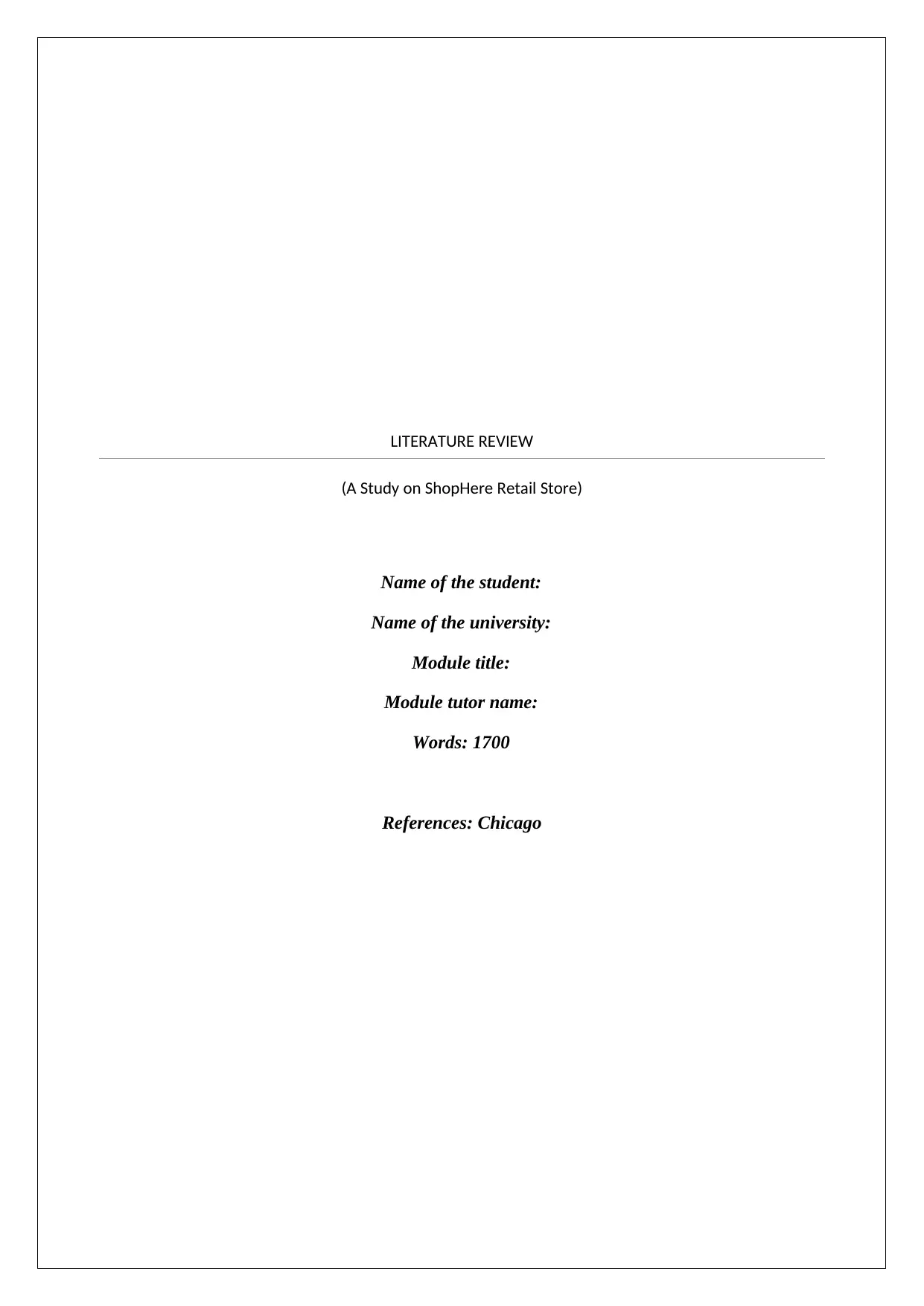
LITERATURE REVIEW
(A Study on ShopHere Retail Store)
Name of the student:
Name of the university:
Module title:
Module tutor name:
Words: 1700
References: Chicago
(A Study on ShopHere Retail Store)
Name of the student:
Name of the university:
Module title:
Module tutor name:
Words: 1700
References: Chicago
Paraphrase This Document
Need a fresh take? Get an instant paraphrase of this document with our AI Paraphraser
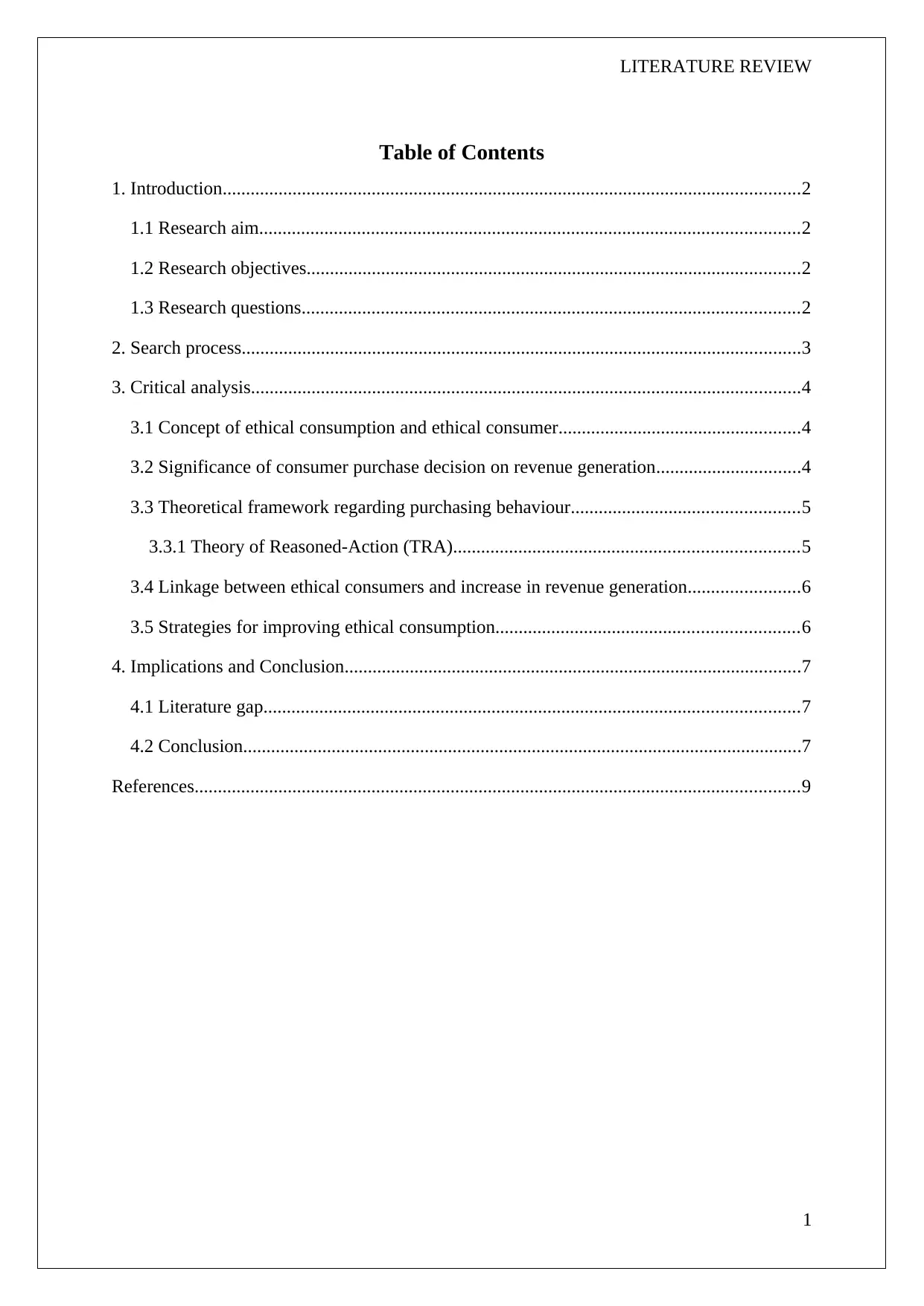
LITERATURE REVIEW
Table of Contents
1. Introduction............................................................................................................................2
1.1 Research aim....................................................................................................................2
1.2 Research objectives..........................................................................................................2
1.3 Research questions...........................................................................................................2
2. Search process........................................................................................................................3
3. Critical analysis......................................................................................................................4
3.1 Concept of ethical consumption and ethical consumer....................................................4
3.2 Significance of consumer purchase decision on revenue generation...............................4
3.3 Theoretical framework regarding purchasing behaviour.................................................5
3.3.1 Theory of Reasoned-Action (TRA)..........................................................................5
3.4 Linkage between ethical consumers and increase in revenue generation........................6
3.5 Strategies for improving ethical consumption.................................................................6
4. Implications and Conclusion..................................................................................................7
4.1 Literature gap...................................................................................................................7
4.2 Conclusion........................................................................................................................7
References..................................................................................................................................9
1
Table of Contents
1. Introduction............................................................................................................................2
1.1 Research aim....................................................................................................................2
1.2 Research objectives..........................................................................................................2
1.3 Research questions...........................................................................................................2
2. Search process........................................................................................................................3
3. Critical analysis......................................................................................................................4
3.1 Concept of ethical consumption and ethical consumer....................................................4
3.2 Significance of consumer purchase decision on revenue generation...............................4
3.3 Theoretical framework regarding purchasing behaviour.................................................5
3.3.1 Theory of Reasoned-Action (TRA)..........................................................................5
3.4 Linkage between ethical consumers and increase in revenue generation........................6
3.5 Strategies for improving ethical consumption.................................................................6
4. Implications and Conclusion..................................................................................................7
4.1 Literature gap...................................................................................................................7
4.2 Conclusion........................................................................................................................7
References..................................................................................................................................9
1
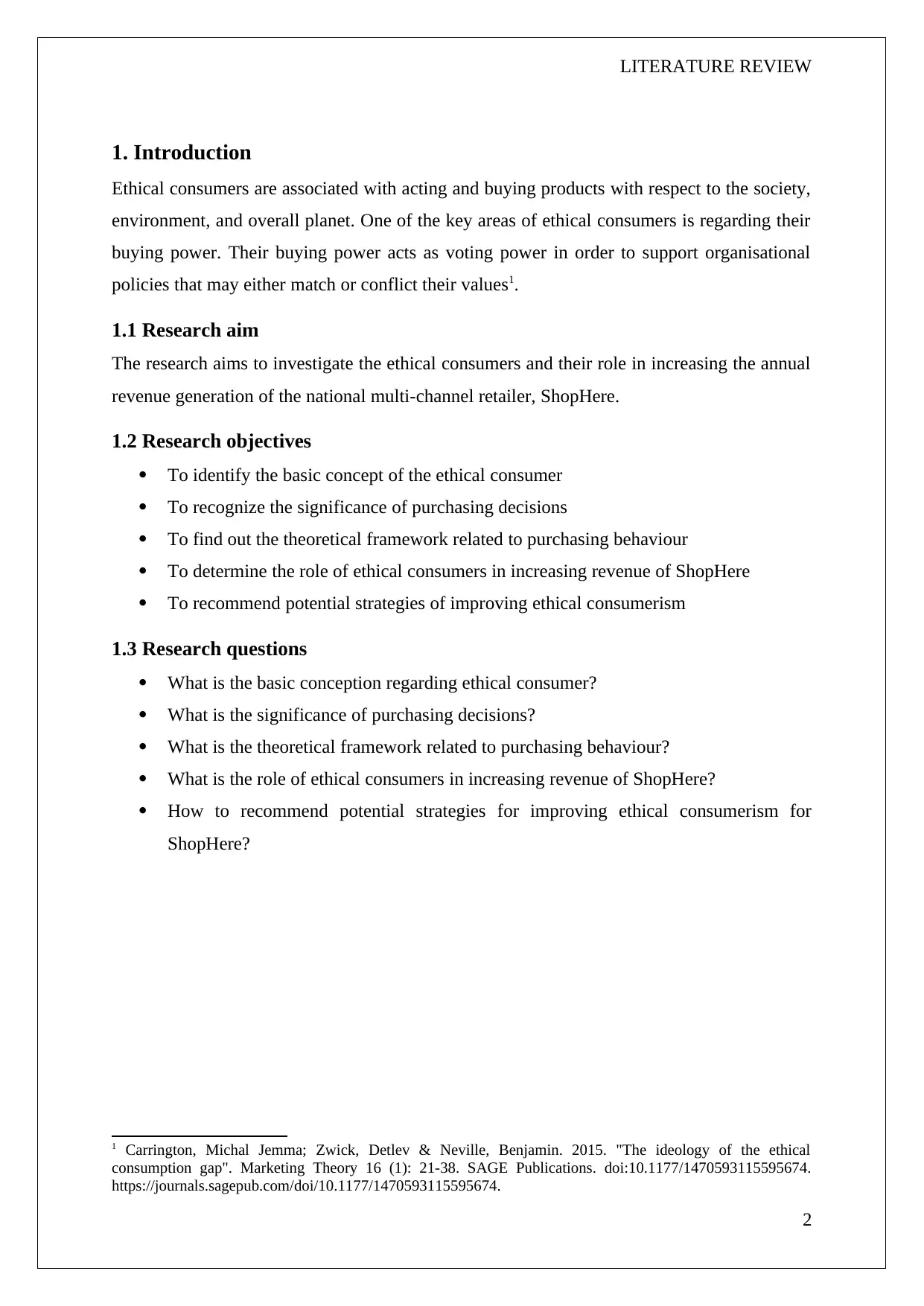
LITERATURE REVIEW
1. Introduction
Ethical consumers are associated with acting and buying products with respect to the society,
environment, and overall planet. One of the key areas of ethical consumers is regarding their
buying power. Their buying power acts as voting power in order to support organisational
policies that may either match or conflict their values1.
1.1 Research aim
The research aims to investigate the ethical consumers and their role in increasing the annual
revenue generation of the national multi-channel retailer, ShopHere.
1.2 Research objectives
To identify the basic concept of the ethical consumer
To recognize the significance of purchasing decisions
To find out the theoretical framework related to purchasing behaviour
To determine the role of ethical consumers in increasing revenue of ShopHere
To recommend potential strategies of improving ethical consumerism
1.3 Research questions
What is the basic conception regarding ethical consumer?
What is the significance of purchasing decisions?
What is the theoretical framework related to purchasing behaviour?
What is the role of ethical consumers in increasing revenue of ShopHere?
How to recommend potential strategies for improving ethical consumerism for
ShopHere?
1 Carrington, Michal Jemma; Zwick, Detlev & Neville, Benjamin. 2015. "The ideology of the ethical
consumption gap". Marketing Theory 16 (1): 21-38. SAGE Publications. doi:10.1177/1470593115595674.
https://journals.sagepub.com/doi/10.1177/1470593115595674.
2
1. Introduction
Ethical consumers are associated with acting and buying products with respect to the society,
environment, and overall planet. One of the key areas of ethical consumers is regarding their
buying power. Their buying power acts as voting power in order to support organisational
policies that may either match or conflict their values1.
1.1 Research aim
The research aims to investigate the ethical consumers and their role in increasing the annual
revenue generation of the national multi-channel retailer, ShopHere.
1.2 Research objectives
To identify the basic concept of the ethical consumer
To recognize the significance of purchasing decisions
To find out the theoretical framework related to purchasing behaviour
To determine the role of ethical consumers in increasing revenue of ShopHere
To recommend potential strategies of improving ethical consumerism
1.3 Research questions
What is the basic conception regarding ethical consumer?
What is the significance of purchasing decisions?
What is the theoretical framework related to purchasing behaviour?
What is the role of ethical consumers in increasing revenue of ShopHere?
How to recommend potential strategies for improving ethical consumerism for
ShopHere?
1 Carrington, Michal Jemma; Zwick, Detlev & Neville, Benjamin. 2015. "The ideology of the ethical
consumption gap". Marketing Theory 16 (1): 21-38. SAGE Publications. doi:10.1177/1470593115595674.
https://journals.sagepub.com/doi/10.1177/1470593115595674.
2
⊘ This is a preview!⊘
Do you want full access?
Subscribe today to unlock all pages.

Trusted by 1+ million students worldwide
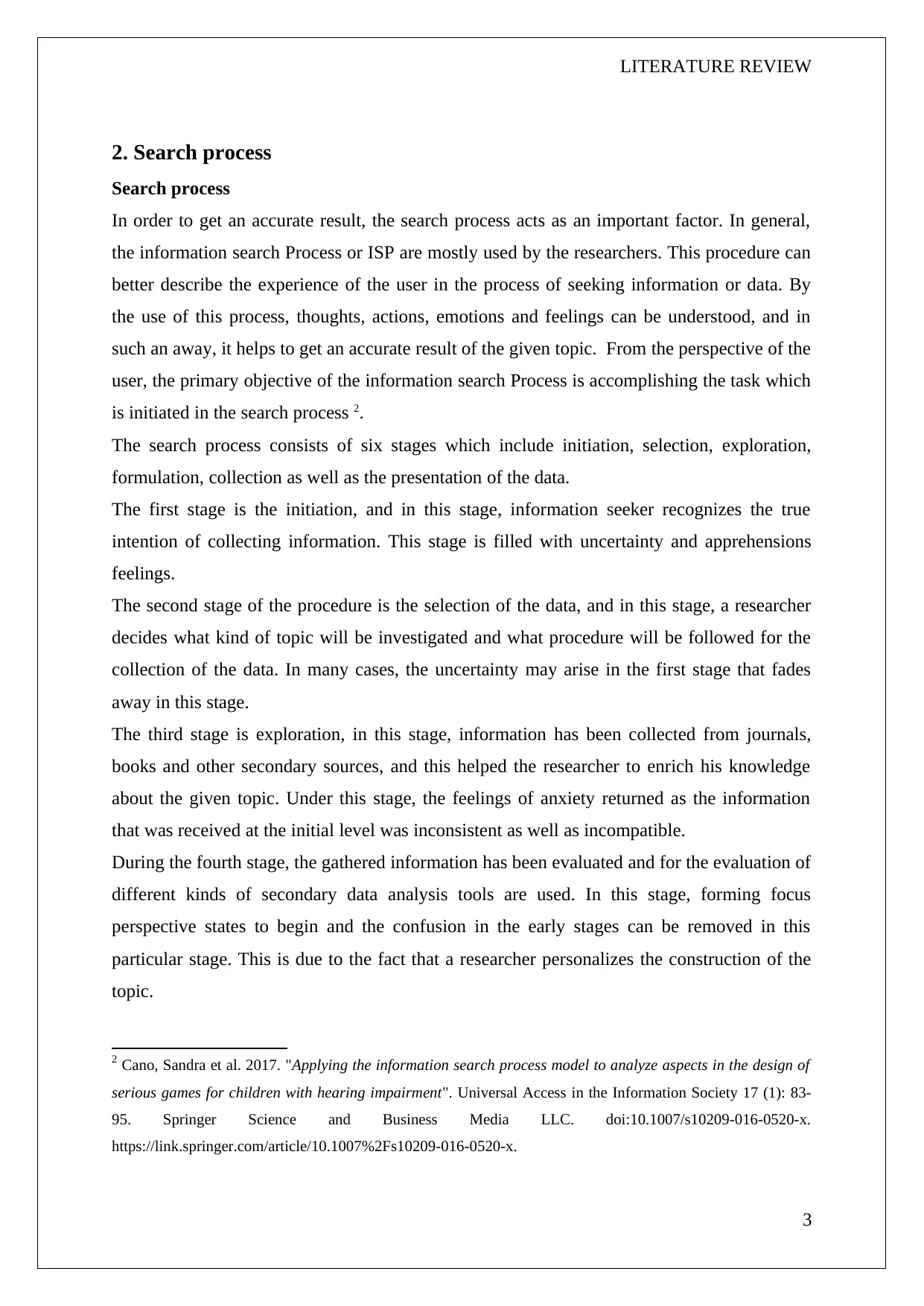
LITERATURE REVIEW
2. Search process
Search process
In order to get an accurate result, the search process acts as an important factor. In general,
the information search Process or ISP are mostly used by the researchers. This procedure can
better describe the experience of the user in the process of seeking information or data. By
the use of this process, thoughts, actions, emotions and feelings can be understood, and in
such an away, it helps to get an accurate result of the given topic. From the perspective of the
user, the primary objective of the information search Process is accomplishing the task which
is initiated in the search process 2.
The search process consists of six stages which include initiation, selection, exploration,
formulation, collection as well as the presentation of the data.
The first stage is the initiation, and in this stage, information seeker recognizes the true
intention of collecting information. This stage is filled with uncertainty and apprehensions
feelings.
The second stage of the procedure is the selection of the data, and in this stage, a researcher
decides what kind of topic will be investigated and what procedure will be followed for the
collection of the data. In many cases, the uncertainty may arise in the first stage that fades
away in this stage.
The third stage is exploration, in this stage, information has been collected from journals,
books and other secondary sources, and this helped the researcher to enrich his knowledge
about the given topic. Under this stage, the feelings of anxiety returned as the information
that was received at the initial level was inconsistent as well as incompatible.
During the fourth stage, the gathered information has been evaluated and for the evaluation of
different kinds of secondary data analysis tools are used. In this stage, forming focus
perspective states to begin and the confusion in the early stages can be removed in this
particular stage. This is due to the fact that a researcher personalizes the construction of the
topic.
2 Cano, Sandra et al. 2017. "Applying the information search process model to analyze aspects in the design of
serious games for children with hearing impairment". Universal Access in the Information Society 17 (1): 83-
95. Springer Science and Business Media LLC. doi:10.1007/s10209-016-0520-x.
https://link.springer.com/article/10.1007%2Fs10209-016-0520-x.
3
2. Search process
Search process
In order to get an accurate result, the search process acts as an important factor. In general,
the information search Process or ISP are mostly used by the researchers. This procedure can
better describe the experience of the user in the process of seeking information or data. By
the use of this process, thoughts, actions, emotions and feelings can be understood, and in
such an away, it helps to get an accurate result of the given topic. From the perspective of the
user, the primary objective of the information search Process is accomplishing the task which
is initiated in the search process 2.
The search process consists of six stages which include initiation, selection, exploration,
formulation, collection as well as the presentation of the data.
The first stage is the initiation, and in this stage, information seeker recognizes the true
intention of collecting information. This stage is filled with uncertainty and apprehensions
feelings.
The second stage of the procedure is the selection of the data, and in this stage, a researcher
decides what kind of topic will be investigated and what procedure will be followed for the
collection of the data. In many cases, the uncertainty may arise in the first stage that fades
away in this stage.
The third stage is exploration, in this stage, information has been collected from journals,
books and other secondary sources, and this helped the researcher to enrich his knowledge
about the given topic. Under this stage, the feelings of anxiety returned as the information
that was received at the initial level was inconsistent as well as incompatible.
During the fourth stage, the gathered information has been evaluated and for the evaluation of
different kinds of secondary data analysis tools are used. In this stage, forming focus
perspective states to begin and the confusion in the early stages can be removed in this
particular stage. This is due to the fact that a researcher personalizes the construction of the
topic.
2 Cano, Sandra et al. 2017. "Applying the information search process model to analyze aspects in the design of
serious games for children with hearing impairment". Universal Access in the Information Society 17 (1): 83-
95. Springer Science and Business Media LLC. doi:10.1007/s10209-016-0520-x.
https://link.springer.com/article/10.1007%2Fs10209-016-0520-x.
3
Paraphrase This Document
Need a fresh take? Get an instant paraphrase of this document with our AI Paraphraser
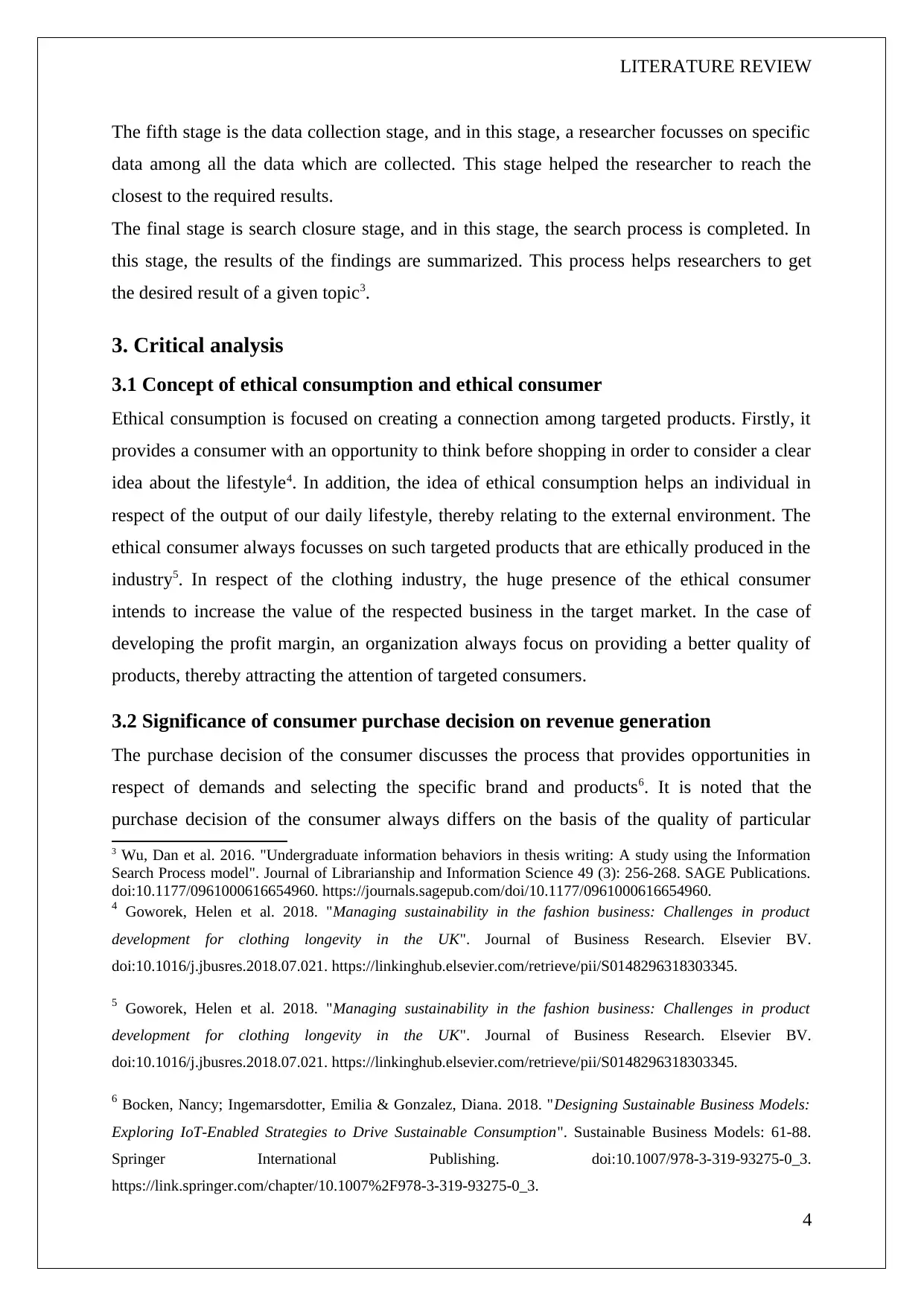
LITERATURE REVIEW
The fifth stage is the data collection stage, and in this stage, a researcher focusses on specific
data among all the data which are collected. This stage helped the researcher to reach the
closest to the required results.
The final stage is search closure stage, and in this stage, the search process is completed. In
this stage, the results of the findings are summarized. This process helps researchers to get
the desired result of a given topic3.
3. Critical analysis
3.1 Concept of ethical consumption and ethical consumer
Ethical consumption is focused on creating a connection among targeted products. Firstly, it
provides a consumer with an opportunity to think before shopping in order to consider a clear
idea about the lifestyle4. In addition, the idea of ethical consumption helps an individual in
respect of the output of our daily lifestyle, thereby relating to the external environment. The
ethical consumer always focusses on such targeted products that are ethically produced in the
industry5. In respect of the clothing industry, the huge presence of the ethical consumer
intends to increase the value of the respected business in the target market. In the case of
developing the profit margin, an organization always focus on providing a better quality of
products, thereby attracting the attention of targeted consumers.
3.2 Significance of consumer purchase decision on revenue generation
The purchase decision of the consumer discusses the process that provides opportunities in
respect of demands and selecting the specific brand and products6. It is noted that the
purchase decision of the consumer always differs on the basis of the quality of particular
3 Wu, Dan et al. 2016. "Undergraduate information behaviors in thesis writing: A study using the Information
Search Process model". Journal of Librarianship and Information Science 49 (3): 256-268. SAGE Publications.
doi:10.1177/0961000616654960. https://journals.sagepub.com/doi/10.1177/0961000616654960.
4 Goworek, Helen et al. 2018. "Managing sustainability in the fashion business: Challenges in product
development for clothing longevity in the UK". Journal of Business Research. Elsevier BV.
doi:10.1016/j.jbusres.2018.07.021. https://linkinghub.elsevier.com/retrieve/pii/S0148296318303345.
5 Goworek, Helen et al. 2018. "Managing sustainability in the fashion business: Challenges in product
development for clothing longevity in the UK". Journal of Business Research. Elsevier BV.
doi:10.1016/j.jbusres.2018.07.021. https://linkinghub.elsevier.com/retrieve/pii/S0148296318303345.
6 Bocken, Nancy; Ingemarsdotter, Emilia & Gonzalez, Diana. 2018. "Designing Sustainable Business Models:
Exploring IoT-Enabled Strategies to Drive Sustainable Consumption". Sustainable Business Models: 61-88.
Springer International Publishing. doi:10.1007/978-3-319-93275-0_3.
https://link.springer.com/chapter/10.1007%2F978-3-319-93275-0_3.
4
The fifth stage is the data collection stage, and in this stage, a researcher focusses on specific
data among all the data which are collected. This stage helped the researcher to reach the
closest to the required results.
The final stage is search closure stage, and in this stage, the search process is completed. In
this stage, the results of the findings are summarized. This process helps researchers to get
the desired result of a given topic3.
3. Critical analysis
3.1 Concept of ethical consumption and ethical consumer
Ethical consumption is focused on creating a connection among targeted products. Firstly, it
provides a consumer with an opportunity to think before shopping in order to consider a clear
idea about the lifestyle4. In addition, the idea of ethical consumption helps an individual in
respect of the output of our daily lifestyle, thereby relating to the external environment. The
ethical consumer always focusses on such targeted products that are ethically produced in the
industry5. In respect of the clothing industry, the huge presence of the ethical consumer
intends to increase the value of the respected business in the target market. In the case of
developing the profit margin, an organization always focus on providing a better quality of
products, thereby attracting the attention of targeted consumers.
3.2 Significance of consumer purchase decision on revenue generation
The purchase decision of the consumer discusses the process that provides opportunities in
respect of demands and selecting the specific brand and products6. It is noted that the
purchase decision of the consumer always differs on the basis of the quality of particular
3 Wu, Dan et al. 2016. "Undergraduate information behaviors in thesis writing: A study using the Information
Search Process model". Journal of Librarianship and Information Science 49 (3): 256-268. SAGE Publications.
doi:10.1177/0961000616654960. https://journals.sagepub.com/doi/10.1177/0961000616654960.
4 Goworek, Helen et al. 2018. "Managing sustainability in the fashion business: Challenges in product
development for clothing longevity in the UK". Journal of Business Research. Elsevier BV.
doi:10.1016/j.jbusres.2018.07.021. https://linkinghub.elsevier.com/retrieve/pii/S0148296318303345.
5 Goworek, Helen et al. 2018. "Managing sustainability in the fashion business: Challenges in product
development for clothing longevity in the UK". Journal of Business Research. Elsevier BV.
doi:10.1016/j.jbusres.2018.07.021. https://linkinghub.elsevier.com/retrieve/pii/S0148296318303345.
6 Bocken, Nancy; Ingemarsdotter, Emilia & Gonzalez, Diana. 2018. "Designing Sustainable Business Models:
Exploring IoT-Enabled Strategies to Drive Sustainable Consumption". Sustainable Business Models: 61-88.
Springer International Publishing. doi:10.1007/978-3-319-93275-0_3.
https://link.springer.com/chapter/10.1007%2F978-3-319-93275-0_3.
4
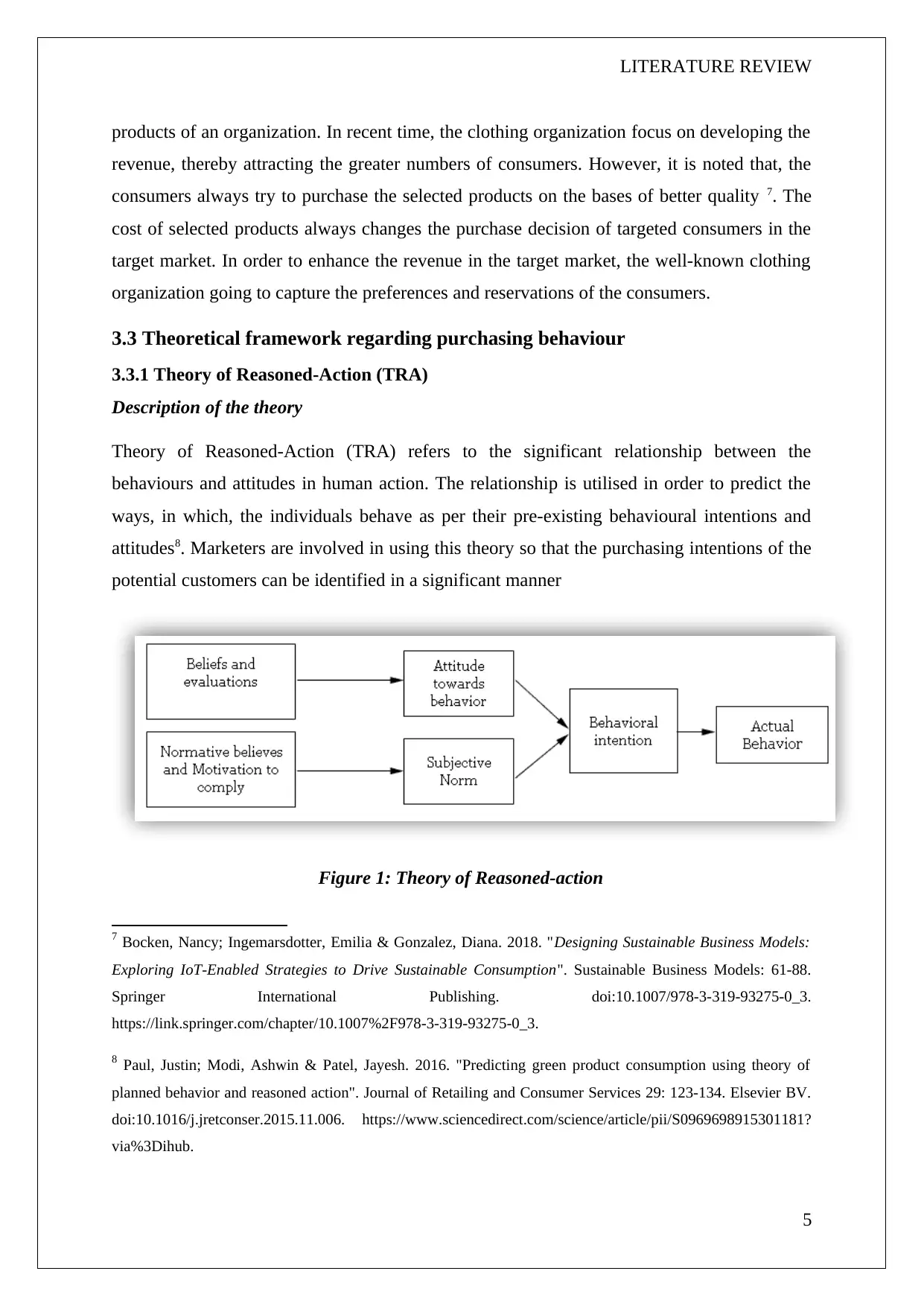
LITERATURE REVIEW
products of an organization. In recent time, the clothing organization focus on developing the
revenue, thereby attracting the greater numbers of consumers. However, it is noted that, the
consumers always try to purchase the selected products on the bases of better quality 7. The
cost of selected products always changes the purchase decision of targeted consumers in the
target market. In order to enhance the revenue in the target market, the well-known clothing
organization going to capture the preferences and reservations of the consumers.
3.3 Theoretical framework regarding purchasing behaviour
3.3.1 Theory of Reasoned-Action (TRA)
Description of the theory
Theory of Reasoned-Action (TRA) refers to the significant relationship between the
behaviours and attitudes in human action. The relationship is utilised in order to predict the
ways, in which, the individuals behave as per their pre-existing behavioural intentions and
attitudes8. Marketers are involved in using this theory so that the purchasing intentions of the
potential customers can be identified in a significant manner
Figure 1: Theory of Reasoned-action
7 Bocken, Nancy; Ingemarsdotter, Emilia & Gonzalez, Diana. 2018. "Designing Sustainable Business Models:
Exploring IoT-Enabled Strategies to Drive Sustainable Consumption". Sustainable Business Models: 61-88.
Springer International Publishing. doi:10.1007/978-3-319-93275-0_3.
https://link.springer.com/chapter/10.1007%2F978-3-319-93275-0_3.
8 Paul, Justin; Modi, Ashwin & Patel, Jayesh. 2016. "Predicting green product consumption using theory of
planned behavior and reasoned action". Journal of Retailing and Consumer Services 29: 123-134. Elsevier BV.
doi:10.1016/j.jretconser.2015.11.006. https://www.sciencedirect.com/science/article/pii/S0969698915301181?
via%3Dihub.
5
products of an organization. In recent time, the clothing organization focus on developing the
revenue, thereby attracting the greater numbers of consumers. However, it is noted that, the
consumers always try to purchase the selected products on the bases of better quality 7. The
cost of selected products always changes the purchase decision of targeted consumers in the
target market. In order to enhance the revenue in the target market, the well-known clothing
organization going to capture the preferences and reservations of the consumers.
3.3 Theoretical framework regarding purchasing behaviour
3.3.1 Theory of Reasoned-Action (TRA)
Description of the theory
Theory of Reasoned-Action (TRA) refers to the significant relationship between the
behaviours and attitudes in human action. The relationship is utilised in order to predict the
ways, in which, the individuals behave as per their pre-existing behavioural intentions and
attitudes8. Marketers are involved in using this theory so that the purchasing intentions of the
potential customers can be identified in a significant manner
Figure 1: Theory of Reasoned-action
7 Bocken, Nancy; Ingemarsdotter, Emilia & Gonzalez, Diana. 2018. "Designing Sustainable Business Models:
Exploring IoT-Enabled Strategies to Drive Sustainable Consumption". Sustainable Business Models: 61-88.
Springer International Publishing. doi:10.1007/978-3-319-93275-0_3.
https://link.springer.com/chapter/10.1007%2F978-3-319-93275-0_3.
8 Paul, Justin; Modi, Ashwin & Patel, Jayesh. 2016. "Predicting green product consumption using theory of
planned behavior and reasoned action". Journal of Retailing and Consumer Services 29: 123-134. Elsevier BV.
doi:10.1016/j.jretconser.2015.11.006. https://www.sciencedirect.com/science/article/pii/S0969698915301181?
via%3Dihub.
5
⊘ This is a preview!⊘
Do you want full access?
Subscribe today to unlock all pages.

Trusted by 1+ million students worldwide
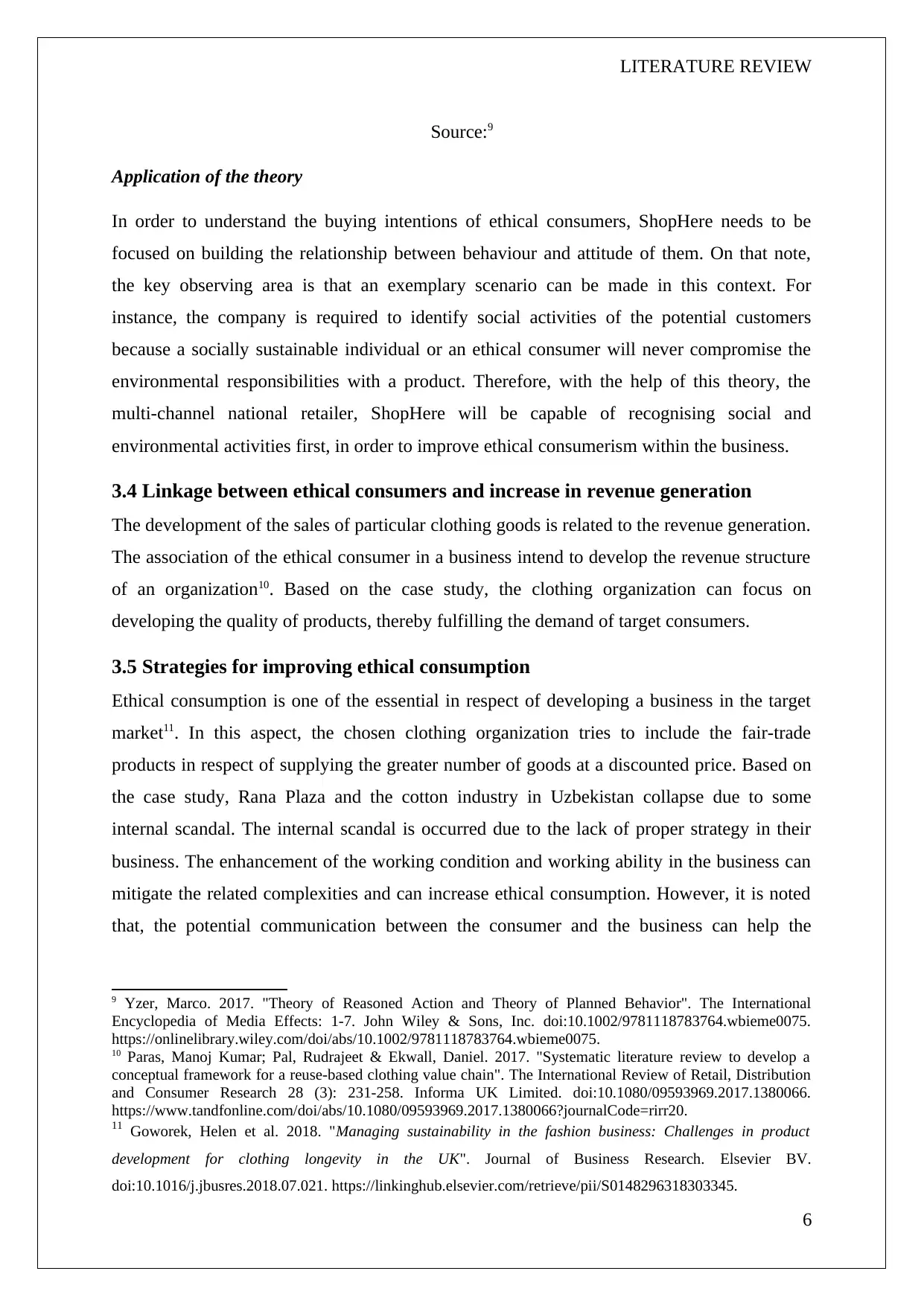
LITERATURE REVIEW
Source:9
Application of the theory
In order to understand the buying intentions of ethical consumers, ShopHere needs to be
focused on building the relationship between behaviour and attitude of them. On that note,
the key observing area is that an exemplary scenario can be made in this context. For
instance, the company is required to identify social activities of the potential customers
because a socially sustainable individual or an ethical consumer will never compromise the
environmental responsibilities with a product. Therefore, with the help of this theory, the
multi-channel national retailer, ShopHere will be capable of recognising social and
environmental activities first, in order to improve ethical consumerism within the business.
3.4 Linkage between ethical consumers and increase in revenue generation
The development of the sales of particular clothing goods is related to the revenue generation.
The association of the ethical consumer in a business intend to develop the revenue structure
of an organization10. Based on the case study, the clothing organization can focus on
developing the quality of products, thereby fulfilling the demand of target consumers.
3.5 Strategies for improving ethical consumption
Ethical consumption is one of the essential in respect of developing a business in the target
market11. In this aspect, the chosen clothing organization tries to include the fair-trade
products in respect of supplying the greater number of goods at a discounted price. Based on
the case study, Rana Plaza and the cotton industry in Uzbekistan collapse due to some
internal scandal. The internal scandal is occurred due to the lack of proper strategy in their
business. The enhancement of the working condition and working ability in the business can
mitigate the related complexities and can increase ethical consumption. However, it is noted
that, the potential communication between the consumer and the business can help the
9 Yzer, Marco. 2017. "Theory of Reasoned Action and Theory of Planned Behavior". The International
Encyclopedia of Media Effects: 1-7. John Wiley & Sons, Inc. doi:10.1002/9781118783764.wbieme0075.
https://onlinelibrary.wiley.com/doi/abs/10.1002/9781118783764.wbieme0075.
10 Paras, Manoj Kumar; Pal, Rudrajeet & Ekwall, Daniel. 2017. "Systematic literature review to develop a
conceptual framework for a reuse-based clothing value chain". The International Review of Retail, Distribution
and Consumer Research 28 (3): 231-258. Informa UK Limited. doi:10.1080/09593969.2017.1380066.
https://www.tandfonline.com/doi/abs/10.1080/09593969.2017.1380066?journalCode=rirr20.
11 Goworek, Helen et al. 2018. "Managing sustainability in the fashion business: Challenges in product
development for clothing longevity in the UK". Journal of Business Research. Elsevier BV.
doi:10.1016/j.jbusres.2018.07.021. https://linkinghub.elsevier.com/retrieve/pii/S0148296318303345.
6
Source:9
Application of the theory
In order to understand the buying intentions of ethical consumers, ShopHere needs to be
focused on building the relationship between behaviour and attitude of them. On that note,
the key observing area is that an exemplary scenario can be made in this context. For
instance, the company is required to identify social activities of the potential customers
because a socially sustainable individual or an ethical consumer will never compromise the
environmental responsibilities with a product. Therefore, with the help of this theory, the
multi-channel national retailer, ShopHere will be capable of recognising social and
environmental activities first, in order to improve ethical consumerism within the business.
3.4 Linkage between ethical consumers and increase in revenue generation
The development of the sales of particular clothing goods is related to the revenue generation.
The association of the ethical consumer in a business intend to develop the revenue structure
of an organization10. Based on the case study, the clothing organization can focus on
developing the quality of products, thereby fulfilling the demand of target consumers.
3.5 Strategies for improving ethical consumption
Ethical consumption is one of the essential in respect of developing a business in the target
market11. In this aspect, the chosen clothing organization tries to include the fair-trade
products in respect of supplying the greater number of goods at a discounted price. Based on
the case study, Rana Plaza and the cotton industry in Uzbekistan collapse due to some
internal scandal. The internal scandal is occurred due to the lack of proper strategy in their
business. The enhancement of the working condition and working ability in the business can
mitigate the related complexities and can increase ethical consumption. However, it is noted
that, the potential communication between the consumer and the business can help the
9 Yzer, Marco. 2017. "Theory of Reasoned Action and Theory of Planned Behavior". The International
Encyclopedia of Media Effects: 1-7. John Wiley & Sons, Inc. doi:10.1002/9781118783764.wbieme0075.
https://onlinelibrary.wiley.com/doi/abs/10.1002/9781118783764.wbieme0075.
10 Paras, Manoj Kumar; Pal, Rudrajeet & Ekwall, Daniel. 2017. "Systematic literature review to develop a
conceptual framework for a reuse-based clothing value chain". The International Review of Retail, Distribution
and Consumer Research 28 (3): 231-258. Informa UK Limited. doi:10.1080/09593969.2017.1380066.
https://www.tandfonline.com/doi/abs/10.1080/09593969.2017.1380066?journalCode=rirr20.
11 Goworek, Helen et al. 2018. "Managing sustainability in the fashion business: Challenges in product
development for clothing longevity in the UK". Journal of Business Research. Elsevier BV.
doi:10.1016/j.jbusres.2018.07.021. https://linkinghub.elsevier.com/retrieve/pii/S0148296318303345.
6
Paraphrase This Document
Need a fresh take? Get an instant paraphrase of this document with our AI Paraphraser
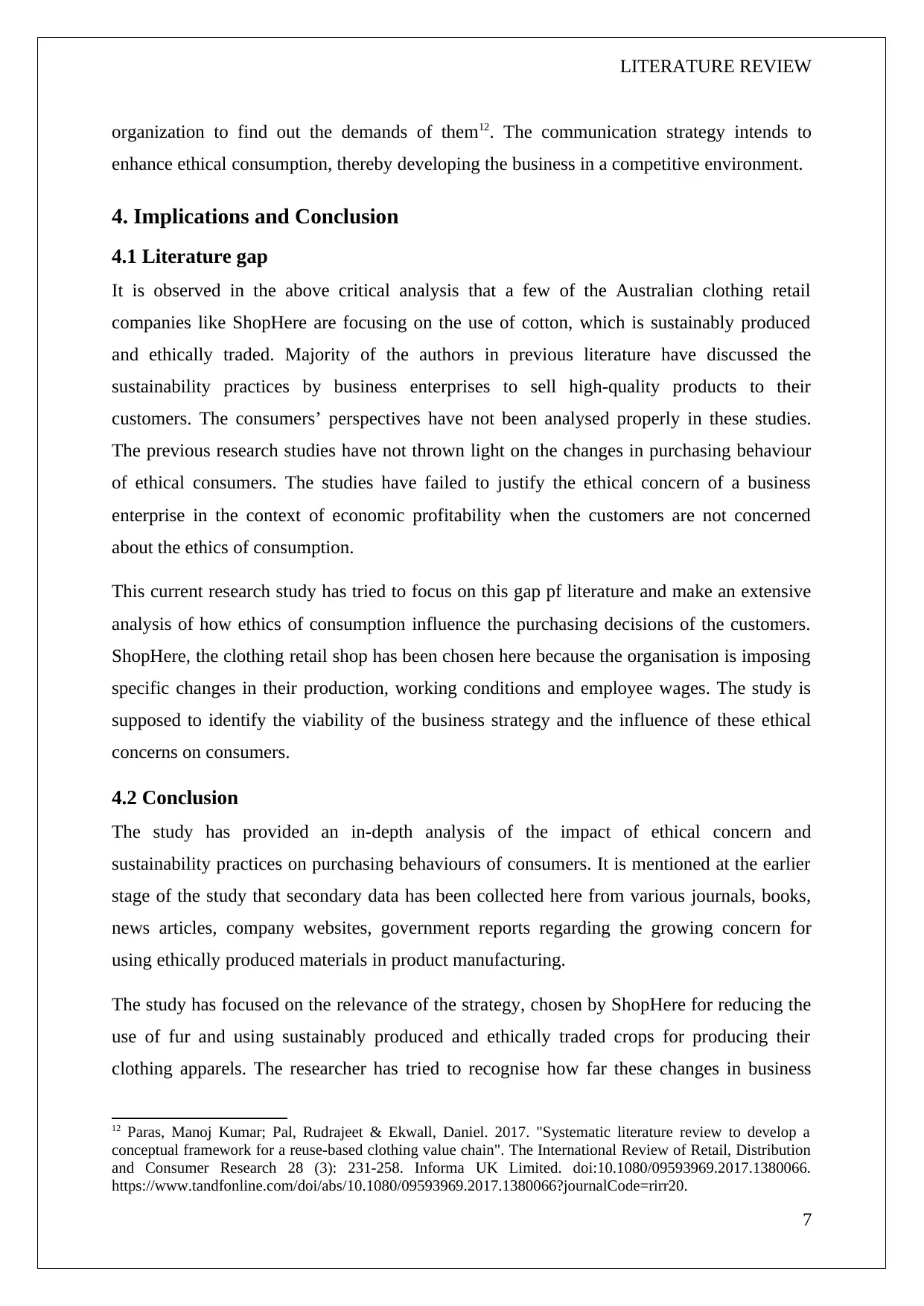
LITERATURE REVIEW
organization to find out the demands of them12. The communication strategy intends to
enhance ethical consumption, thereby developing the business in a competitive environment.
4. Implications and Conclusion
4.1 Literature gap
It is observed in the above critical analysis that a few of the Australian clothing retail
companies like ShopHere are focusing on the use of cotton, which is sustainably produced
and ethically traded. Majority of the authors in previous literature have discussed the
sustainability practices by business enterprises to sell high-quality products to their
customers. The consumers’ perspectives have not been analysed properly in these studies.
The previous research studies have not thrown light on the changes in purchasing behaviour
of ethical consumers. The studies have failed to justify the ethical concern of a business
enterprise in the context of economic profitability when the customers are not concerned
about the ethics of consumption.
This current research study has tried to focus on this gap pf literature and make an extensive
analysis of how ethics of consumption influence the purchasing decisions of the customers.
ShopHere, the clothing retail shop has been chosen here because the organisation is imposing
specific changes in their production, working conditions and employee wages. The study is
supposed to identify the viability of the business strategy and the influence of these ethical
concerns on consumers.
4.2 Conclusion
The study has provided an in-depth analysis of the impact of ethical concern and
sustainability practices on purchasing behaviours of consumers. It is mentioned at the earlier
stage of the study that secondary data has been collected here from various journals, books,
news articles, company websites, government reports regarding the growing concern for
using ethically produced materials in product manufacturing.
The study has focused on the relevance of the strategy, chosen by ShopHere for reducing the
use of fur and using sustainably produced and ethically traded crops for producing their
clothing apparels. The researcher has tried to recognise how far these changes in business
12 Paras, Manoj Kumar; Pal, Rudrajeet & Ekwall, Daniel. 2017. "Systematic literature review to develop a
conceptual framework for a reuse-based clothing value chain". The International Review of Retail, Distribution
and Consumer Research 28 (3): 231-258. Informa UK Limited. doi:10.1080/09593969.2017.1380066.
https://www.tandfonline.com/doi/abs/10.1080/09593969.2017.1380066?journalCode=rirr20.
7
organization to find out the demands of them12. The communication strategy intends to
enhance ethical consumption, thereby developing the business in a competitive environment.
4. Implications and Conclusion
4.1 Literature gap
It is observed in the above critical analysis that a few of the Australian clothing retail
companies like ShopHere are focusing on the use of cotton, which is sustainably produced
and ethically traded. Majority of the authors in previous literature have discussed the
sustainability practices by business enterprises to sell high-quality products to their
customers. The consumers’ perspectives have not been analysed properly in these studies.
The previous research studies have not thrown light on the changes in purchasing behaviour
of ethical consumers. The studies have failed to justify the ethical concern of a business
enterprise in the context of economic profitability when the customers are not concerned
about the ethics of consumption.
This current research study has tried to focus on this gap pf literature and make an extensive
analysis of how ethics of consumption influence the purchasing decisions of the customers.
ShopHere, the clothing retail shop has been chosen here because the organisation is imposing
specific changes in their production, working conditions and employee wages. The study is
supposed to identify the viability of the business strategy and the influence of these ethical
concerns on consumers.
4.2 Conclusion
The study has provided an in-depth analysis of the impact of ethical concern and
sustainability practices on purchasing behaviours of consumers. It is mentioned at the earlier
stage of the study that secondary data has been collected here from various journals, books,
news articles, company websites, government reports regarding the growing concern for
using ethically produced materials in product manufacturing.
The study has focused on the relevance of the strategy, chosen by ShopHere for reducing the
use of fur and using sustainably produced and ethically traded crops for producing their
clothing apparels. The researcher has tried to recognise how far these changes in business
12 Paras, Manoj Kumar; Pal, Rudrajeet & Ekwall, Daniel. 2017. "Systematic literature review to develop a
conceptual framework for a reuse-based clothing value chain". The International Review of Retail, Distribution
and Consumer Research 28 (3): 231-258. Informa UK Limited. doi:10.1080/09593969.2017.1380066.
https://www.tandfonline.com/doi/abs/10.1080/09593969.2017.1380066?journalCode=rirr20.
7
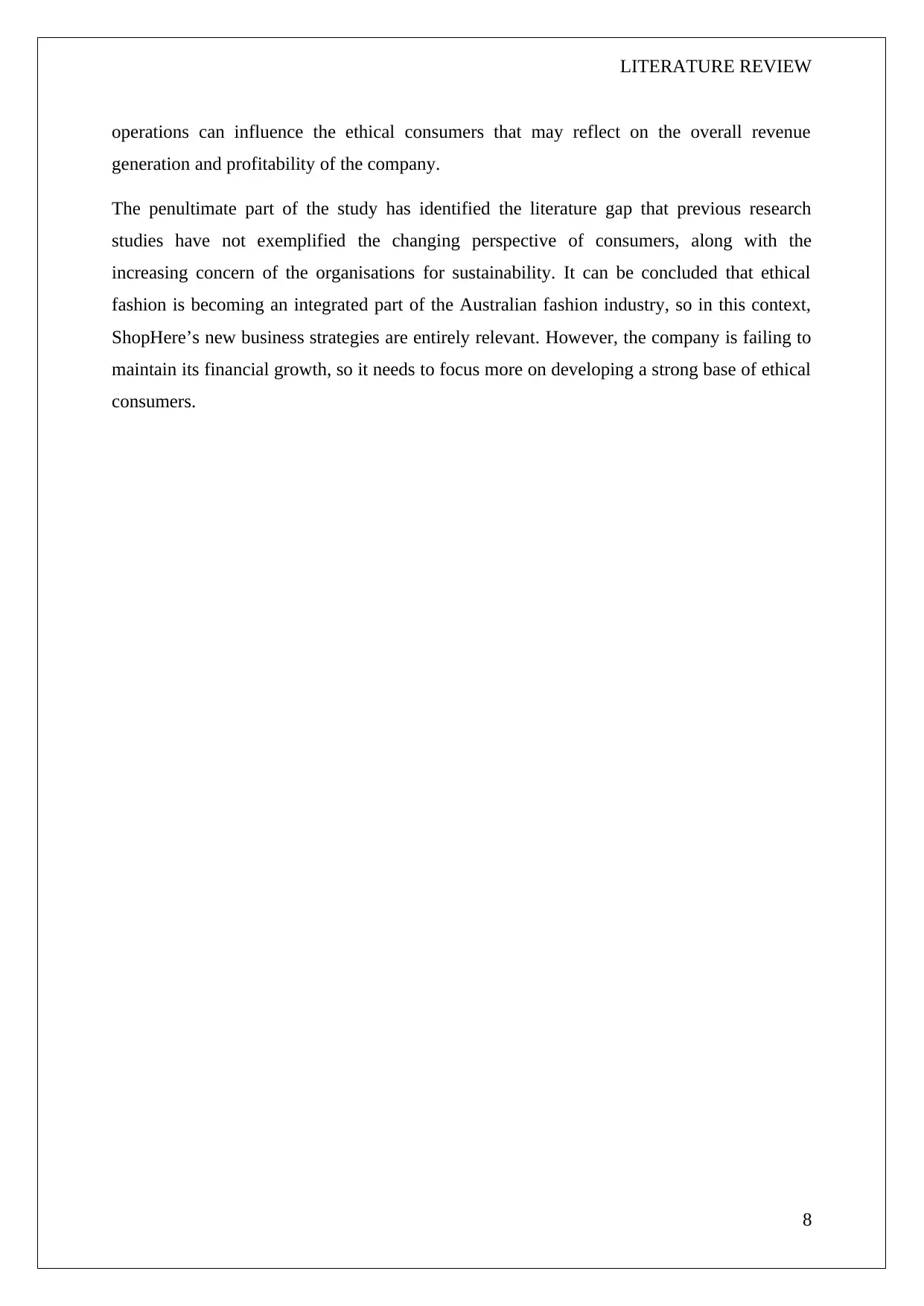
LITERATURE REVIEW
operations can influence the ethical consumers that may reflect on the overall revenue
generation and profitability of the company.
The penultimate part of the study has identified the literature gap that previous research
studies have not exemplified the changing perspective of consumers, along with the
increasing concern of the organisations for sustainability. It can be concluded that ethical
fashion is becoming an integrated part of the Australian fashion industry, so in this context,
ShopHere’s new business strategies are entirely relevant. However, the company is failing to
maintain its financial growth, so it needs to focus more on developing a strong base of ethical
consumers.
8
operations can influence the ethical consumers that may reflect on the overall revenue
generation and profitability of the company.
The penultimate part of the study has identified the literature gap that previous research
studies have not exemplified the changing perspective of consumers, along with the
increasing concern of the organisations for sustainability. It can be concluded that ethical
fashion is becoming an integrated part of the Australian fashion industry, so in this context,
ShopHere’s new business strategies are entirely relevant. However, the company is failing to
maintain its financial growth, so it needs to focus more on developing a strong base of ethical
consumers.
8
⊘ This is a preview!⊘
Do you want full access?
Subscribe today to unlock all pages.

Trusted by 1+ million students worldwide
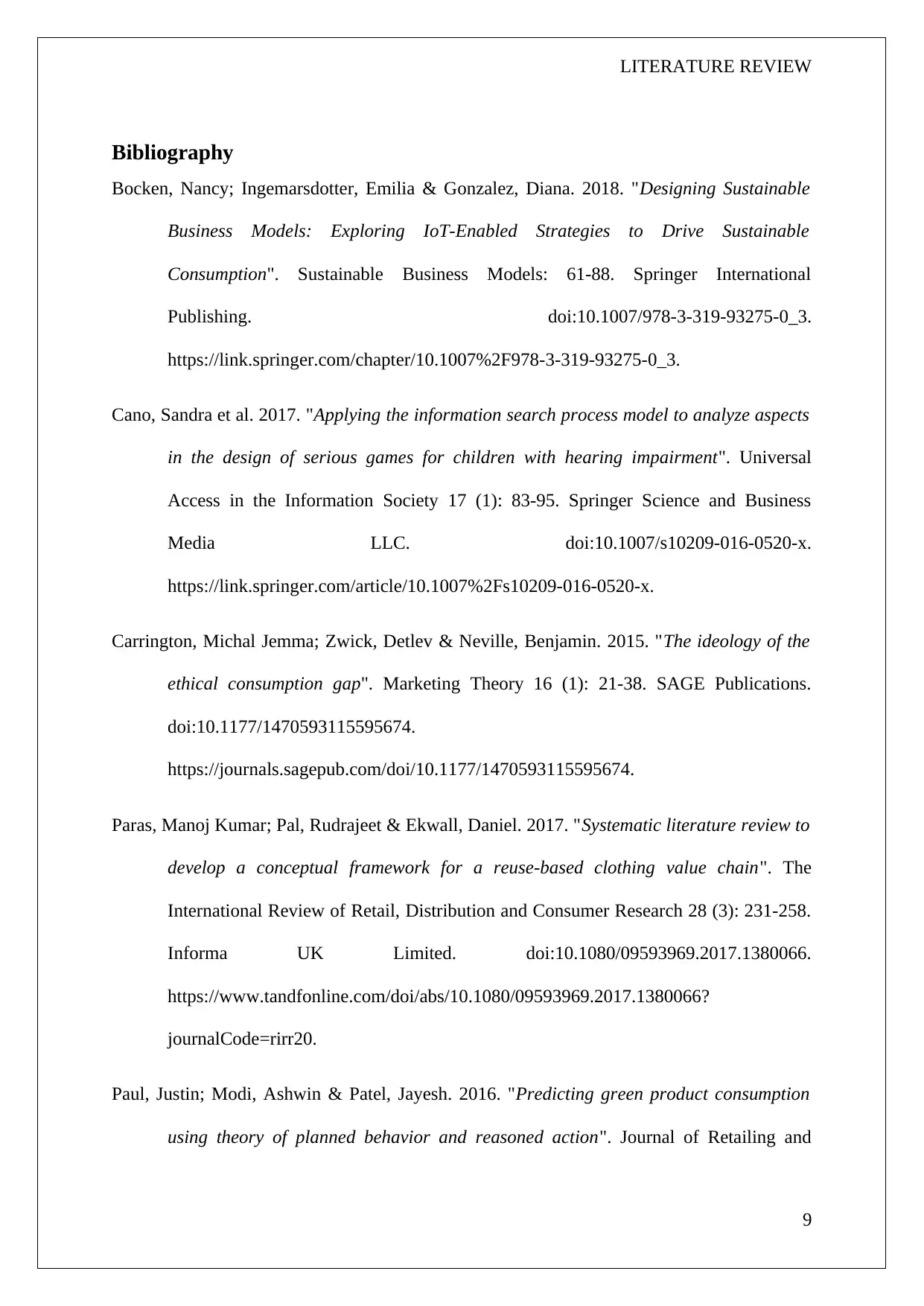
LITERATURE REVIEW
Bibliography
Bocken, Nancy; Ingemarsdotter, Emilia & Gonzalez, Diana. 2018. "Designing Sustainable
Business Models: Exploring IoT-Enabled Strategies to Drive Sustainable
Consumption". Sustainable Business Models: 61-88. Springer International
Publishing. doi:10.1007/978-3-319-93275-0_3.
https://link.springer.com/chapter/10.1007%2F978-3-319-93275-0_3.
Cano, Sandra et al. 2017. "Applying the information search process model to analyze aspects
in the design of serious games for children with hearing impairment". Universal
Access in the Information Society 17 (1): 83-95. Springer Science and Business
Media LLC. doi:10.1007/s10209-016-0520-x.
https://link.springer.com/article/10.1007%2Fs10209-016-0520-x.
Carrington, Michal Jemma; Zwick, Detlev & Neville, Benjamin. 2015. "The ideology of the
ethical consumption gap". Marketing Theory 16 (1): 21-38. SAGE Publications.
doi:10.1177/1470593115595674.
https://journals.sagepub.com/doi/10.1177/1470593115595674.
Paras, Manoj Kumar; Pal, Rudrajeet & Ekwall, Daniel. 2017. "Systematic literature review to
develop a conceptual framework for a reuse-based clothing value chain". The
International Review of Retail, Distribution and Consumer Research 28 (3): 231-258.
Informa UK Limited. doi:10.1080/09593969.2017.1380066.
https://www.tandfonline.com/doi/abs/10.1080/09593969.2017.1380066?
journalCode=rirr20.
Paul, Justin; Modi, Ashwin & Patel, Jayesh. 2016. "Predicting green product consumption
using theory of planned behavior and reasoned action". Journal of Retailing and
9
Bibliography
Bocken, Nancy; Ingemarsdotter, Emilia & Gonzalez, Diana. 2018. "Designing Sustainable
Business Models: Exploring IoT-Enabled Strategies to Drive Sustainable
Consumption". Sustainable Business Models: 61-88. Springer International
Publishing. doi:10.1007/978-3-319-93275-0_3.
https://link.springer.com/chapter/10.1007%2F978-3-319-93275-0_3.
Cano, Sandra et al. 2017. "Applying the information search process model to analyze aspects
in the design of serious games for children with hearing impairment". Universal
Access in the Information Society 17 (1): 83-95. Springer Science and Business
Media LLC. doi:10.1007/s10209-016-0520-x.
https://link.springer.com/article/10.1007%2Fs10209-016-0520-x.
Carrington, Michal Jemma; Zwick, Detlev & Neville, Benjamin. 2015. "The ideology of the
ethical consumption gap". Marketing Theory 16 (1): 21-38. SAGE Publications.
doi:10.1177/1470593115595674.
https://journals.sagepub.com/doi/10.1177/1470593115595674.
Paras, Manoj Kumar; Pal, Rudrajeet & Ekwall, Daniel. 2017. "Systematic literature review to
develop a conceptual framework for a reuse-based clothing value chain". The
International Review of Retail, Distribution and Consumer Research 28 (3): 231-258.
Informa UK Limited. doi:10.1080/09593969.2017.1380066.
https://www.tandfonline.com/doi/abs/10.1080/09593969.2017.1380066?
journalCode=rirr20.
Paul, Justin; Modi, Ashwin & Patel, Jayesh. 2016. "Predicting green product consumption
using theory of planned behavior and reasoned action". Journal of Retailing and
9
Paraphrase This Document
Need a fresh take? Get an instant paraphrase of this document with our AI Paraphraser
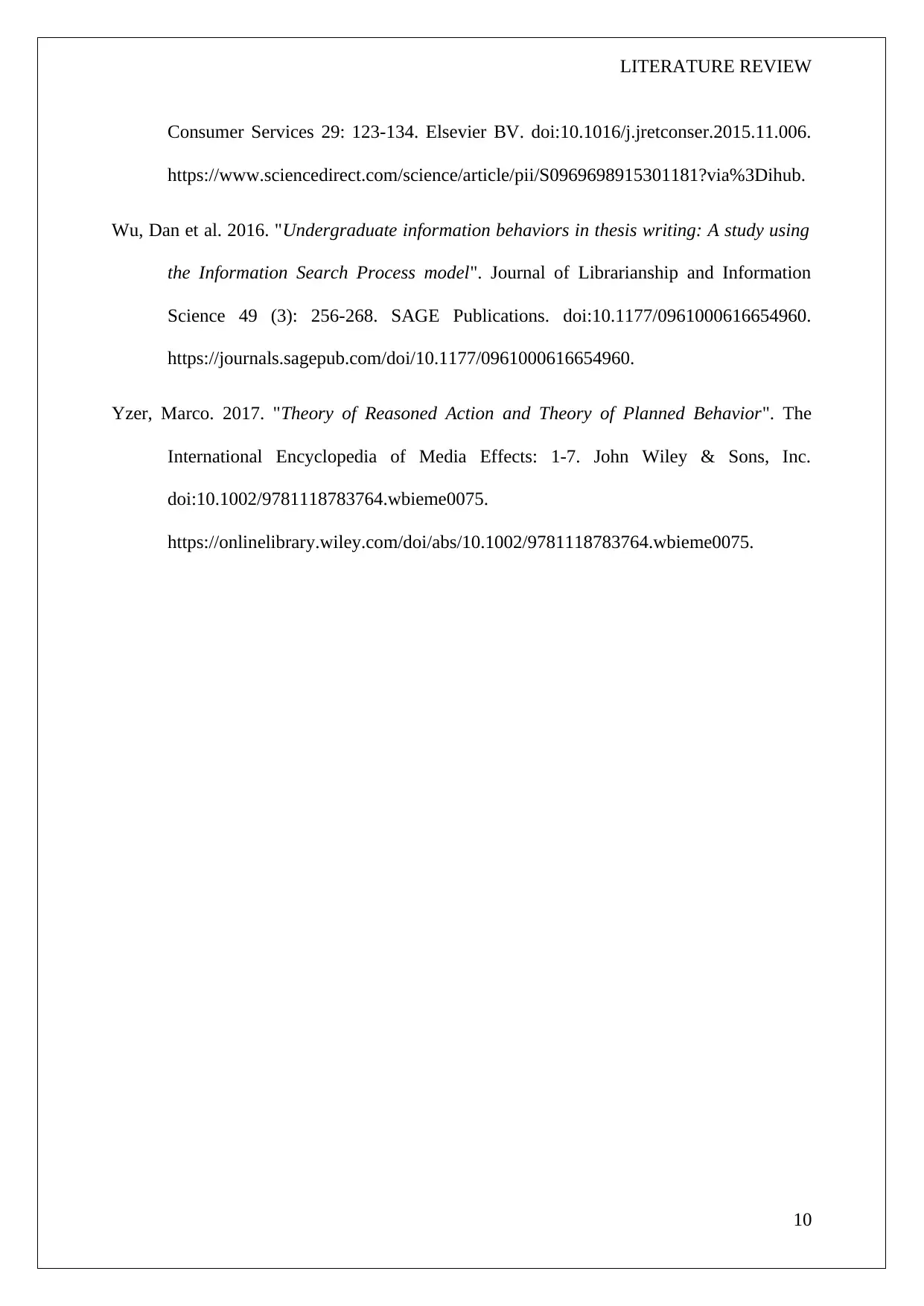
LITERATURE REVIEW
Consumer Services 29: 123-134. Elsevier BV. doi:10.1016/j.jretconser.2015.11.006.
https://www.sciencedirect.com/science/article/pii/S0969698915301181?via%3Dihub.
Wu, Dan et al. 2016. "Undergraduate information behaviors in thesis writing: A study using
the Information Search Process model". Journal of Librarianship and Information
Science 49 (3): 256-268. SAGE Publications. doi:10.1177/0961000616654960.
https://journals.sagepub.com/doi/10.1177/0961000616654960.
Yzer, Marco. 2017. "Theory of Reasoned Action and Theory of Planned Behavior". The
International Encyclopedia of Media Effects: 1-7. John Wiley & Sons, Inc.
doi:10.1002/9781118783764.wbieme0075.
https://onlinelibrary.wiley.com/doi/abs/10.1002/9781118783764.wbieme0075.
10
Consumer Services 29: 123-134. Elsevier BV. doi:10.1016/j.jretconser.2015.11.006.
https://www.sciencedirect.com/science/article/pii/S0969698915301181?via%3Dihub.
Wu, Dan et al. 2016. "Undergraduate information behaviors in thesis writing: A study using
the Information Search Process model". Journal of Librarianship and Information
Science 49 (3): 256-268. SAGE Publications. doi:10.1177/0961000616654960.
https://journals.sagepub.com/doi/10.1177/0961000616654960.
Yzer, Marco. 2017. "Theory of Reasoned Action and Theory of Planned Behavior". The
International Encyclopedia of Media Effects: 1-7. John Wiley & Sons, Inc.
doi:10.1002/9781118783764.wbieme0075.
https://onlinelibrary.wiley.com/doi/abs/10.1002/9781118783764.wbieme0075.
10
1 out of 11
Related Documents
Your All-in-One AI-Powered Toolkit for Academic Success.
+13062052269
info@desklib.com
Available 24*7 on WhatsApp / Email
![[object Object]](/_next/static/media/star-bottom.7253800d.svg)
Unlock your academic potential
Copyright © 2020–2026 A2Z Services. All Rights Reserved. Developed and managed by ZUCOL.





